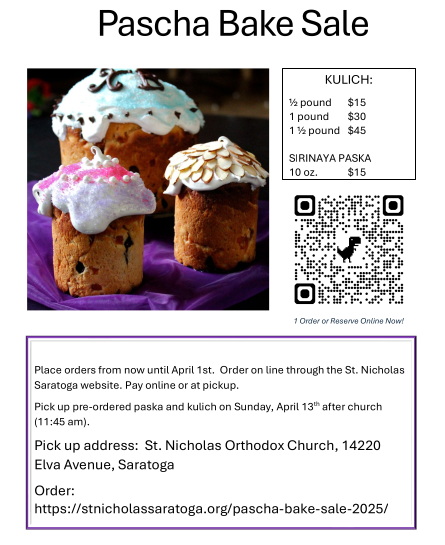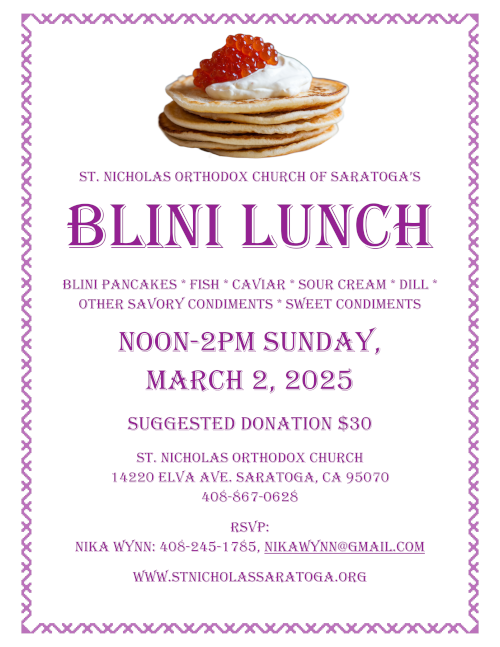
Orthopraxis - A Sermon by Bishop James on the feast of St. John of San Francisco
In the name of the Father, and of the Son, and of the Holy Spirit!
Your eminences, your graces, reverend fathers, dear and beloved brothers and sisters in the Lord, our gospel today speaks of the fact that there is no greater love than can be demonstrated than when a man lays his life down for his friends. I am the good shepherd, says the Lord, and the good shepherd lays his life down for the sheep. good shepherd lays his life down for the sheep. In our midst we celebrate one who laid his life down for his flock, Saint John of Shanghai and San Francisco.
And we are gathered like bees around a honeycomb, or like iron is drawn to a magnet. All of us in our hearts are drawn to his presence today, albeit we see him only in the remnants of his physical being from which he departed in 1966. physical being from which he departed in 1966. But through our Lord Jesus Christ, neither death nor any other tribulation conquers the race of man. And St. John remains present with us this day even as when he served in this church or in Shanghai or in Western Europe in any of the other places in which he served.
There is an extraordinary story of a priest in Siberia who was reluctant to serve liturgy because it was 10 degrees below zero, but his reader knocked on the door and they had to go to church, and he prepared proskomedia, and as he began sensing, a few people walked into this remote village church, and he rejoiced, even though the temperature was extremely cold. Soon the church became full of people even those gifted in singing. He forgot how cold he was and momentarily three bishops entered the altar. They proceeded to the time of Holy Communion, where we are at this moment. And he looked at the three bishops and he motioned to them, do you wish to commune? One of them waved him off and motioned that he should commune. He did so. He prepared the holy gifts. And then he opened the curtains and the beautiful gates to commune the throng of people who, to his delight, had come to church that day. But when he opened the gates, the beautiful gates to the altar, there was only one person in church, his reader, whom he communed.
And when he returned to the altar, there was only himself. The bishops were not there. He began to reflect. Some of these people in church looked familiar, and then it dawned on him these were the people whom he had commemorated at the proskomedia for the departed. And he looked on the wall of his altar and he saw an icon of St. Basil the Great, Gregory the Theologian, and John Chrysostom. And he realized these were the three hierarchs in his altar. He completely forgot about the cold for his heart was full of rejoicing in the grace of God that had been visited in his church that day, showing him that in the divine liturgy we are united with all those who have come before us and even those who will succeed us.
Today, therefore, we may be confident that St. John of Shanghai and San Francisco is a concelebrant with us today, and we are united in the heavenly liturgy in which he is now a participant. When we approach St. John, do we sometimes feel, I can’t reach the heights of his labors. I can’t fast so that I eat only once a day at 11 o'clock at night. I can’t sleep sitting up in a chair for an hour, maybe two hours a night. I cannot take a freezing cold water bath every morning around 3 or 4 a.m. to chase away sleep. In a way, that is intimidating to think that we are called to such ascetic labors which but a few in a generation are capable of undertaking.
But St. John would not ask that of us. In fact, one young man in China started sleeping in a chair and eating bread and water, I think at the age of 14, in order to imitate St. John and to be like his beloved archpastor. Needless to say, his grades started to decline and his performance in other aspects of life began also to decline, at which point his parents called this to the saint’s attention and they met in St. John’s office. St. John said to him, so you would like to imitate me? Oh yes, your eminence, of course. You will do what I ask? Yes, I will. It was during Lent, St. John brought this young man a thick Polish sausage and said, eat it. He could not disobey his archpastor, so he did. And Vladika admonished him firmly but with pastoral love, obedience is higher than ascetic labors. You are to do only what your parents ask and to come to church as you always do. This young man later went on to be a devout priest of our Russian Orthodox Church outside Russia.
So brothers and sisters, if St. John would not ask us to literally imitate him in his ascetic and prayerful labors, would he not also say to each one of us, as he said to this young man, for us to be obedient in the capacities to which our spiritual father calls us, to attend church as we do, to be faithful in our prayers he would say all of those he would advise all of that to us but most importantly he would tell us love God we would not be here gathered around St. John if we were not attracted in essence to the love of God which he showed not only in his self-denial but in his service to his clergy, his fellow arch pastors, and to all the faithful that he ministered to and who asked his prayers in the years that he walked this earth. You could say that St. John’s energies, his spiritual energies, were always directed up to God without interruption. In fact, there was a homily recently given by one of our fellow hierarchs, Bishop Luke of Syracuse, in blessing a cross and a monument in a church dedicated to St. John back East. And the first words of his sermon were that St. John was 24 hours a day, seven days a week, ceaselessly devoted to God.
Can any of us imagine St. John taking a break from his prayers to engage in some superfluous and frivolous distraction? It is impossible for me even to fathom that for a moment. So what St. John would advise us, not merely to say to us to love God, but he would admonish us to be very careful about allowing the energies from our soul to begin to ascend to God, but then to come back inside of us. When that happens, it is as though we have taken an electrical plug and we’ve unplugged ourselves from the source of all light, grace, and energy.
None of us of our own has any light to offer anyone. Jesus Christ says, I am the light of the world. Whatever light we possess is by virtue of whatever union we have with God and brothers and sisters that is up to us the Lord does not impose union with him upon us we have to choose it that’s why the holy apostle Paul says pray without ceasing Let’s put that in a different phrase. Stay in a prayerful state so that the grace of God can continually inform you through your heart, your conscience, and your intuition. How many of us would say, well, my own judgment is better than the informing of God. And yet, that is exactly what the fall of man is. It’s the fall of the angels that fell away from God too. They thought they could do it better than God. A false sense of autonomy. And we’ve all heard it, the self-made man. I don’t need God. I don’t need my parents. I don’t need my priest. I’m making this decision myself. this is a strong pull within the nature of each one of us to be a kind of independent contractor as though we are omniscient, omnipresent, and have all the characteristics of God, and he’s an afterthought. I’m making this decision myself.
The minute we unplug from the grace of God, what happens to us? We become isolated. And an isolated soul is then vulnerable to the influence of the adversary of man. You all know the story about St. John at a bishop’s conference and the discussions were done. One bishop wanted to say to him, “Pomolimsya Vladika, let us go pray, Your Eminence.“ He opened his mouth, but he couldn’t say those words. Why? He could see St. John was already in a state of prayer. Why would you say to somebody, let’s go pray, when their prayerful state convicts you of the fact that you’re not prayerful yourself. During this beautiful divine liturgy, brothers and sisters, could any of us start worrying about the concerns and cares that we have? We were vouchsafed to lay aside all earthly cares to be in the presence of God and his saints, and in particular, St. John.
There is another church where we can find the same feeling as we have here today in this grace-filled service. If only we choose to fill that church with the same grace that we find here today. Where is that church? That church is entitled, The Church Beneath the Roof of the Temple of My Soul.
What we see here today, the singing, the reading, the candles, the incense, the prayer, the candles, the incense, the prayer. That is what we must have within our OWN church beneath the roof of the temple of our soul. And that is why being in a prayerful state unceasingly is such a blessing. It means that our speech, our thoughts, blessing it means that our speech our thoughts and our actions will be informed by the divine grace rather than us trying to put the burden of figuring everything out in our lives on our own shoulders with our own faculties and resources.
St. John, therefore, stayed plugged in to the grace of God. The adversary of mankind’s constant effort is to get us to unplug so that he can have a conversation with us and fill our being with every manner of stress and propaganda. And he will tell us that prayer is an oppression. Oh, you can pray later tonight. Just be with your own thoughts, your own fantasies, your own daydreams. But we don’t have to do that in our lives, brothers and sisters, and the consultant or the mentor in the art of staying in prayer with and connected to God so that every moment is informed and protected, empowered, and filled with the divine grace is there in our midst. And all we have to do is to call upon him, and he will be instantly in our midst to help us. A phrase in our Holy Orthodox faith says, as wondrous is God in his saints to him be glory honor and dominion forever amen!
Upcoming Events
Upcoming events this month are in the online calendar, which you can subscribe to on your phone or tablet. Use the print button on the calendar to print a copy.
Click below to print a copy of this newsletter:



